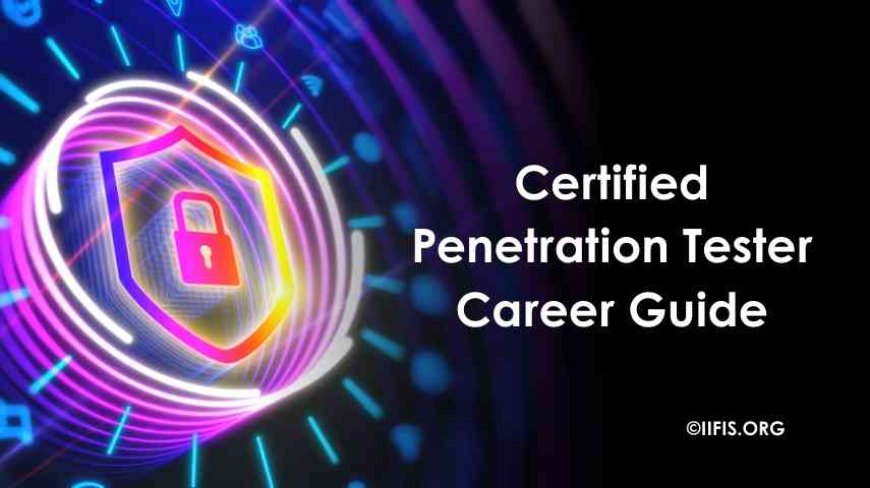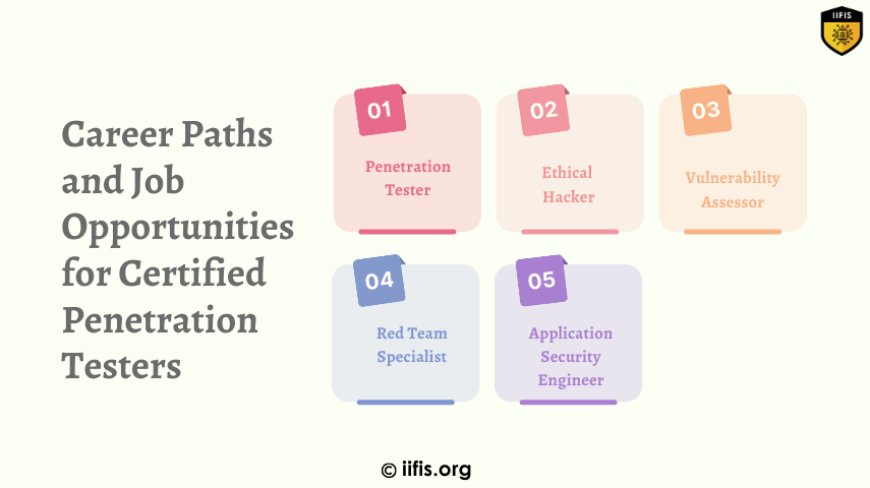Certified Penetration Tester: Career Guide
Unlock a successful career in cybersecurity with our Certified Penetration Tester Career Guide. Learn essential skills, certification pathways, and expert tips to excel as a penetration tester.

In today’s digital landscape, cybersecurity professionals play a crucial role in protecting organizations from the ever-evolving threats of cyberattacks. Among these experts, Certified Penetration Testers (CPTs) hold a unique and valued position. A CPT is not only skilled in identifying and exploiting security vulnerabilities but is also trained to think like a hacker, uncovering potential threats before malicious actors do. If you're considering a career as a Certified Penetration Tester, this guide is your ultimate roadmap. We’ll explore the skills, certifications, and pathways that can lead you to this exciting and high-demand role in cybersecurity, offering a blend of practical insights and professional tips to help you excel in one of the most impactful careers in tech. Let’s dive into what it takes to become a Certified Penetration Tester and make a meaningful impact on digital security.
What is Penetration Testing?
Penetration Testing (pen testing) is a security practice where ethical hackers simulate cyberattacks on systems, networks, or applications. Its goal is to identify and fix vulnerabilities before they can be exploited by malicious actors.
Purpose of Penetration Testing
Pen testing helps organizations:
- Identify security weaknesses
- Test their defenses
- Meet compliance standards
- Improve security awareness
Types of Penetration Testing
-
Network Pen Testing: Analyzes internal and external networks.
-
Web Application Pen Testing: Finds web app vulnerabilities like SQL injection and XSS.
-
Social Engineering Testing: Tests employee security awareness through phishing and similar tactics.
-
Wireless Testing: Assesses wireless networks for weak points.
-
Physical Pen Testing: Tests physical access controls.
-
Mobile App Pen Testing: Evaluates mobile app security on iOS and Android.
Pen Testing vs. Vulnerability Assessment
-
Pen Testing: Actively exploits vulnerabilities to simulate attacks.
-
Vulnerability Assessment: Identifies potential vulnerabilities without exploiting them.
Pen tests are deeper and riskier, providing a realistic assessment of defenses, while vulnerability assessments are broader but don’t test exploitability.
Key Differences Between Penetration Testing and Vulnerability Assessment
While both methods aim to improve security, penetration testing and vulnerability assessments differ significantly in scope and approach:In summary, while vulnerability assessments provide a baseline of security posture by identifying weak spots, penetration testing is a more intensive approach that actively exploits those weak spots, giving organizations a realistic view of their defenses and opportunities to address security gaps proactively.
Who is a Certified Penetration Tester?
A Certified Penetration Tester is a cybersecurity professional trained and certified to identify, exploit, and help fix security vulnerabilities in networks, applications, and systems. With specialized certifications, they validate their skills and knowledge to perform ethical hacking within legal boundaries.
Role and Responsibilities
The primary responsibilities of a certified penetration tester include:
-
Conducting Simulated Attacks: Simulate real-world cyberattacks to find security gaps.
-
Identifying and Documenting Vulnerabilities: Highlight weaknesses and create detailed reports.
-
Collaborating with Teams: Work with IT and security teams to implement solutions.
-
Staying Updated on Threats: Continuously learn about the latest security trends and threats.
Skills Required to Succeed
Certified penetration testers need a mix of technical, analytical, and soft skills:
-
Technical Skills: Proficiency in network protocols, programming, cryptography, and tools like Metasploit, Nmap, and Burp Suite.
-
Analytical Skills: Strong problem-solving, attention to detail, and pattern-recognition abilities.
-
Soft Skills: Communication, teamwork, and adaptability are essential, as testers often translate complex findings into actionable recommendations.
Job Expectations and Work Environment
Penetration testers work in diverse environments, from corporate offices to remote setups, often collaborating with IT and security teams. Their work is typically project-based, requiring rigorous testing, thorough documentation, and clear communication with stakeholders about risks and mitigation strategies.
Essential Skills and Knowledge Areas for Certification
To succeed as a certified penetration tester, it’s crucial to master a blend of technical skills, tools, and foundational knowledge.
Key Technical Skills
-
Networking: Understanding TCP/IP, UDP, DNS, and other networking protocols is essential to identify and exploit network vulnerabilities.
-
Programming: Familiarity with languages like Python, Bash, or PowerShell helps in scripting attacks and automating tasks.
-
System Administration: Knowledge of both Linux and Windows environments enables testers to navigate systems, identify weaknesses, and understand configurations.
Common Tools Used by Penetration Testers
-
Metasploit: A widely used framework for developing and executing exploit code against remote targets, crucial for testing and demonstrating vulnerabilities.
-
Nmap: A network scanning tool for discovering hosts, open ports, and services, useful in the reconnaissance phase of pen testing.
-
Burp Suite: A tool for testing web application security by intercepting HTTP requests, commonly used to find vulnerabilities like SQL injection and cross-site scripting (XSS).
-
Wireshark: Network protocol analyzer that helps monitor network traffic and detect abnormal behaviors.
-
John the Ripper: Password-cracking tool used for testing password strength and cracking password hashes.
Foundational Knowledge Areas
-
Operating Systems: Proficiency in Linux, Windows, and Mac OS, as well as command-line interfaces, is crucial for system navigation and vulnerability detection.
-
Networking Protocols: In-depth knowledge of HTTP, FTP, SMTP, and DNS helps testers understand data transmission, spot protocol weaknesses, and simulate attacks effectively.
-
Cryptography: Understanding encryption algorithms, hashing, and SSL/TLS provides the necessary skills to test secure data transmission and detect flaws in cryptographic implementations.
Mastering these technical skills, tools, and foundational knowledge areas provides a strong foundation for certification and builds expertise to succeed in real-world penetration testing.
Why Become a Certified Penetration Tester?
-
Industry Recognition and Credibility
-
Earning a certification in penetration testing validates expertise and commitment, establishing you as a trusted professional in the cybersecurity industry. Certification is widely recognized and respected by employers, demonstrating that you meet high standards in ethical hacking.
-
Career Advancement and Higher Earning Potential
-
Certified penetration testers are in high demand, with opportunities to move into advanced roles like security consultant, ethical hacker, or cybersecurity manager. This demand often translates into competitive salaries and increased earning potential, as companies prioritize skilled professionals to safeguard their systems.
-
Personal and Professional Benefits
-
Beyond career growth, certification builds confidence in technical skills and analytical abilities, while also fostering critical thinking and problem-solving capabilities. Certification keeps you up-to-date on the latest cybersecurity trends, tools, and attack strategies, ensuring continual professional growth and expertise in the field.
Key Certifications for Penetration Testers
Here’s an overview of popular penetration testing certifications and their pros and cons to help choose the right one based on your career goals and skill level.
1. Certified Ethical Hacker (CEH)
-
Overview: CEH focuses on ethical hacking fundamentals, covering various hacking techniques, tools, and technologies.
-
Pros: Well-recognized entry-level certification; provides a broad foundation in cybersecurity.
-
Cons: Less hands-on; theoretical focus may require additional practice in real-world scenarios.
-
Best For: Beginners to intermediates looking to build a career in ethical hacking.
2. Offensive Security Certified Professional (OSCP)
-
Overview: OSCP is a hands-on certification from Offensive Security that emphasizes practical skills in real-world hacking.
-
Pros: Highly respected; focuses on hands-on skills with an intensive 24-hour exam.
-
Cons: Challenging and time-intensive, especially for beginners; requires a strong commitment to self-study.
-
Best For: Those with some prior experience in cybersecurity seeking advanced, practical expertise.
3.IIFIS Penetration Tester
-
Overview: Offered by IIFIS, covers a broad range of penetration testing skills and tools, from reconnaissance to exploitation.
-
Pros: Comprehensive curriculum with a solid reputation; emphasizes a balance of theoretical knowledge and practical skills.
-
Cons: Higher cost; suited for professionals with foundational knowledge.
-
Best For: Intermediate to advanced practitioners looking to validate broad penetration testing skills.
4.Choosing the Right Certification
-
Beginner-Level: Start with CEH to build foundational knowledge.
-
Intermediate-Level:OSCP provides broad skills and is a great stepping stone to more intensive certifications.
-
Advanced-Level: OSCP offer deep, hands-on experience suited to those with existing cybersecurity knowledge looking to specialize further.
Choosing the right certification ultimately depends on your career goals, current skills, and how much time you’re ready to invest in practical training.
Career Paths and Job Opportunities for Certified Penetration Testers
Typical Job Titles

-
Penetration Tester
-
Ethical Hacker
-
Vulnerability Assessor
-
Red Team Specialist
-
Application Security Engineer
Industries Hiring Penetration Testers
-
Finance: Banks and financial institutions prioritize cybersecurity.
-
Government: Agencies protect national security and public data.
-
Tech: Tech companies secure platforms, apps, and user data.
-
Healthcare: Hospitals and providers protect patient data.
-
Retail and E-commerce: Companies ensure secure online transactions.
Potential Career Progression
-
Security Consultant: Provide expert security guidance across organizations.
-
Red Team Lead: Oversee ethical hacking teams simulating cyberattacks.
-
Cybersecurity Manager: Manage security teams and strategies for broader protection.
Certified penetration testers have varied paths and opportunities for growth, making it an exciting and dynamic career field.
Salary Expectations and Job Outlook for Penetration Testers in India
Average Salary Range
The average salary for penetration testers in India typically ranges from ₹5 lakh to ₹15 lakh per year, depending on several factors:
-
Experience: Entry-level testers may start around ₹5-7 lakh, while those with significant experience or specialized certifications can earn ₹12-15 lakh or more.
-
Location: Major cities like Bangalore, Mumbai, and Delhi often offer higher salaries due to increased demand and living costs.
-
Certifications: Higher-level certifications like OSCP, GPEN, or CPENT can significantly boost earning potential, as they reflect advanced skills.
Future Job Outlook and Demand
The demand for penetration testers in India is expected to grow substantially due to:
-
Rising Cyber Threats: With increasing cyber attacks across all sectors, organizations are investing more in proactive security.
-
Compliance Requirements: Regulatory standards such as GDPR and India’s Data Protection Bill encourage companies to strengthen cybersecurity, often requiring regular penetration testing.
-
Expanding Digital Transformation: As more businesses digitize operations, demand for cybersecurity experts, including penetration testers, is steadily rising.
Penetration testing is a promising career path in India with strong growth prospects driven by the need for cybersecurity resilience and compliance.
Becoming a certified penetration tester opens doors to roles across sectors, including financial institutions (IIFIS), healthcare, and tech. Start with the basics—like networking and programming—and practice in labs or with capture-the-flag challenges. Earning certifications such as CEH, OSCP, or GPEN validates your skills and enhances your career prospects.
If it feels overwhelming, take it step-by-step. Build one skill at a time, and join the cybersecurity community for guidance, resources, and support. With dedication, you'll be ready for a successful career in penetration testing.
























